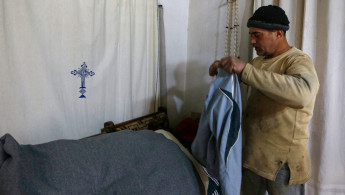Youth exodus takes joy out of Christmas celebrations in Syria
Inside a Syrian monastery desecrated by jihadists, Matanios Dalloul stood alone by the shattered altar where a once-thriving community celebrated Christmas before the threat of death drove them out.
The 62-year-old is one of 20 Christians remaining in the central town of Al-Qaryatain out of the community that boasted 900 members before conflict broke out a decade ago.
Tracing a cross against his body between piles of broken stone, the lone parishioner prayed for long life for the remnants of a dwindling community which has nobody left under the age of 40.
"The holidays need people, they need young boys and girls, not just piles of stone," Dalloul told AFP, gesturing at what remains of the mud brick walls of the Mar Elian monastery.
"It is people who generate holiday cheer, and if people do not return, there will be no joy."
The town of Al-Qaryatain in Homs province was once viewed as a symbol of coexistence between Christian and Muslim communities who had lived together for centuries before jihadists of the Islamic State group seized the area in 2015.
IS fighters razed the fifth-century Syriac Catholic monastery of Mar Elian (Saint Elian) and abducted hundreds of Christians, who were locked in an underground dungeon in the desert for 25 days before being freed.
Six years have passed since the Islamic State group had been ousted from the town but most of the Christians who fled have not returned and those who remain have neither a church nor a priest to turn to this holiday season.
"The last time the churches of Al-Qaryatain celebrated Christmas was in 2015 before the arrival of IS," said Dalloul whose three children have all emigrated to Europe or Canada.
"Now, there are no open churches, nor a priest to oversee Christmas mass," he said.
Dalloul is not alone in his disappointment.
Bassam Debbas said he does not have a single relative left in Syria and will therefore spend Christmas alone, working in a small workshop where he produces grape molasses.
"I don't have anyone left, not a father, nor a mother, nor siblings, nor a wife... I will spend the holiday as though it is any other day, any other working day," the 61-year-old said.
Debbas returned to Al-Qaryatain this year to resume the family trade of molasses production from a small workshop where grapes are fermented and then cooked.
Constant power cuts make the cooking a challenge but he is trying to maintain bare minimum production levels despite the odds.
Outside his home, the street is empty. Traces of IS rule are still visible on the crater-riddled walls of neighbouring buildings, most of which are either levelled or abandoned.
"The holidays have become completely different since IS arrived and brought sadness into the hearts of the people," Debbas said.
"IS has gone, but the sadness remains," he lamented, the scent of molasses filling the air around him.
Inside Samira Khoury's home, red rosary beads hang from a small golden cross placed on a wooden table.
A single red candle is lit beside a portrait of Jesus and the Virgin Mary.
There are no Christmas decorations.
The 68-year-old and her three sisters were among dozens of Christians kidnapped and locked up by IS in 2015.
"Since that day, happiness has disappeared completely from our home," she said, huddling by a heater.
Without relatives or neighbours to celebrate with, Khoury said "happiness tastes different and the holidays don't look" the way they used to.
"Nothing is the same," she said.
Feeding a small stove with fire wood, Phillipe Azar said his Christmas is once again blighted by the sadness of loss.
"My family has left and my friends are dead," said the 49-year-old, who lives alone in a 10-room house once bustling with relatives.
Azar -- who hasn't put up any Christmas decorations since the start of Syria's war in 2011 -- said he will spend the holiday near his heater.
He may invite an 80-year-old friend over for a glass of wine but that is only if he is in good enough health to come visit.
"The Christmas tree has been packed in a box since 2011," Azar said.
"Who should I put it up for? Why would I celebrate alone, without my siblings, neighbours and friends?"





 Follow the Middle East's top stories in English at The New Arab on Google News
Follow the Middle East's top stories in English at The New Arab on Google News


